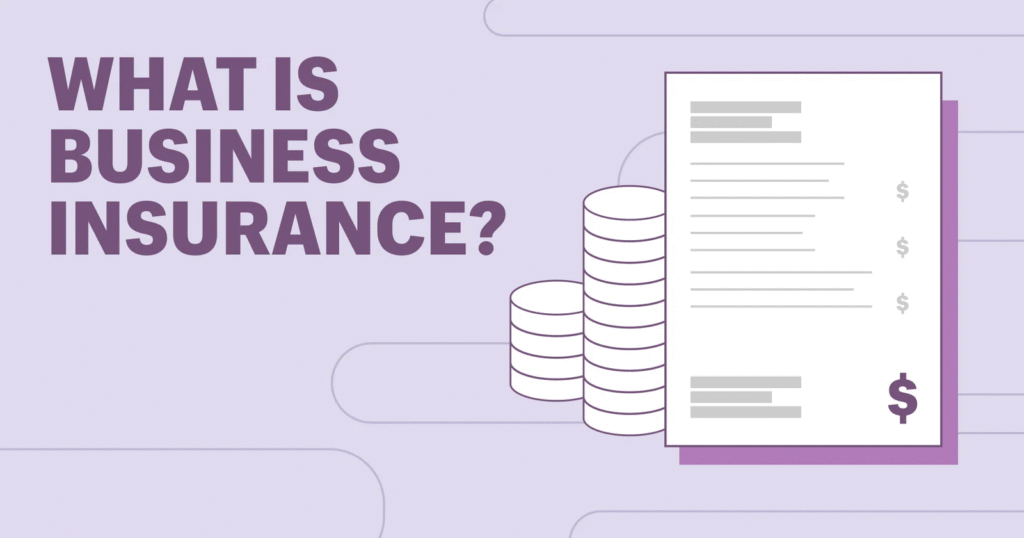Insurance
affordable insurance, auto insurance, business insurance, car insurance, commercial insurance, cyber insurance, general liability insurance, health insurance, home insurance, insurance, insurance agent, insurance broker, insurance claims, insurance company, insurance coverage, insurance for small business, insurance policy, insurance provider, insurance quotes, insurance services, insurance solutions, liability insurance, life insurance, property insurance, renters insurance, term insurance, travel insurance, whole life insurance, workers compensation insurance
Admin
What Is Business Insurance and Why Does Your Company Need It?
Introduction
In today’s ever-evolving and unpredictable business environment, companies face a variety of risks — from property damage and liability issues to cyber threats and employee-related incidents. This is where business insurance becomes an essential shield. Whether you’re a small startup, a growing eCommerce store, or a large manufacturing firm, having the right insurance coverage can mean the difference between surviving a crisis or shutting your doors for good.
But what exactly is business insurance? Why is it necessary, and how can it benefit your organization in both the short and long term? In this comprehensive guide, we’ll explore the fundamentals of business insurance, the different types available, legal requirements, common misconceptions, and how to choose the right coverage for your unique needs.
Key Takeaways
- Business insurance protects companies from financial losses due to lawsuits, property damage, employee injuries, and more.
- It’s essential for legal compliance, client trust, and business continuity.
- General liability, property, workers’ comp, and professional liability are the most common types.
- Costs vary widely based on your industry, size, and risk level — but are usually a fraction of what a single claim could cost.
- Regularly review and update your policies to ensure full protection as your business grows.
What Is Business Insurance?

Business insurance refers to a broad category of policies designed to protect a company from financial losses that may arise due to unforeseen events. These policies cover a wide range of risks — including property damage, legal liability, employee-related risks, cyberattacks, and more — depending on the nature of the business and the industry.
The core purpose of business insurance is to:
- Protect your assets
- Ensure business continuity
- Comply with legal requirements
- Provide peace of mind to business owners and investors
Why Your Company Needs Business Insurance

1. Legal Protection and Compliance
Many states and countries require businesses to carry certain types of insurance. For example:
- Workers’ compensation is mandatory in most U.S. states.
- Commercial auto insurance is required for business vehicles.
- Professional liability insurance may be required in regulated industries like finance, healthcare, and law.
Failing to comply can result in fines, lawsuits, or even forced shutdowns.
2. Protection from Financial Loss
Imagine a fire destroys your office or a customer sues you for injuries sustained on your property. Without insurance, the costs of legal defense, property replacement, or medical bills could be devastating. Business insurance helps cover these expenses so you can recover and continue operating.
3. Safeguards Employees and Reputation
Business insurance also includes employee-related coverages, like workers’ compensation and group health insurance. Offering these benefits not only ensures legal compliance but also boosts morale and aids in talent retention.
4. Supports Business Continuity
Certain types of insurance, such as business interruption insurance, can replace lost income when your company has to close temporarily due to events like natural disasters. This ensures that your bills, payroll, and other expenses are covered while operations are paused.
5. Builds Credibility and Trust
Clients and partners often prefer working with insured businesses. It shows that you’re responsible, prepared, and trustworthy. Some contracts may even require proof of coverage before signing an agreement.
Types of Business Insurance
Different businesses face different risks. Below are the most common types of business insurance:
1. General Liability Insurance
Covers legal costs and damages if your business is held responsible for:
- Bodily injuries
- Property damage
- Personal or advertising injuries
2. Commercial Property Insurance
Protects your physical assets — including buildings, equipment, furniture, and inventory — from damage caused by fire, theft, vandalism, and natural disasters.
3. Business Interruption Insurance
Reimburses lost income and operating expenses if your business is temporarily shut down due to a covered event like a flood or fire.
4. Professional Liability Insurance (Errors & Omissions)
Covers businesses against claims of negligence, malpractice, or inadequate work. Essential for service-based industries like consulting, law, and healthcare.
5. Workers’ Compensation Insurance
Provides wage replacement and medical benefits to employees injured on the job. Also protects your business from employee-related lawsuits.
6. Commercial Auto Insurance
Covers vehicles used for business purposes. Includes liability, collision, comprehensive, and uninsured motorist coverage.
7. Cyber Liability Insurance
Protects against data breaches, cyberattacks, and the legal costs that follow. Increasingly important for any business handling sensitive customer data.
8. Product Liability Insurance
Protects manufacturers, distributors, and retailers from claims related to defective or harmful products.
Industries That Need Business Insurance the Most
While all businesses can benefit from insurance, the following sectors are especially vulnerable to risk:
- Retail – theft, liability claims, property damage
- Construction – equipment damage, on-site injuries, liability
- Healthcare – malpractice suits, data breaches
- Technology – IP disputes, cyberattacks, service errors
- Hospitality – customer injuries, property loss, business interruption
- Real Estate – property damage, legal disputes, tenant issues
How Much Does Business Insurance Cost?
The cost of business insurance varies depending on:
- The size and type of business
- Industry and associated risks
- Number of employees
- Coverage limits and deductibles
- Business location
- Claims history
For example, a sole proprietor may pay as little as $500 per year for general liability insurance, while a large firm could spend tens of thousands annually across multiple policies.
To get the best rate:
- Compare quotes from multiple insurers
- Consider bundling policies (e.g., Business Owner’s Policy)
- Work with a trusted insurance broker
Common Misconceptions About Business Insurance
“My business is too small to need insurance.”
Even freelancers and home-based businesses face risks, such as being sued for professional errors or data breaches.
“I don’t have employees, so I’m covered.”
Insurance protects more than just payroll — think about property, clients, and even digital data.
“Business insurance is too expensive.”
Not having insurance is far more expensive in the event of a lawsuit or disaster.
“I only need one type of policy.”
Most businesses need a combination of policies to be fully protected.
Real-World Case Studies: When Business Insurance Saved the Day
Case Study 1: A Restaurant Fire and Business Interruption Insurance
In 2022, a small, family-run restaurant in California suffered a kitchen fire that forced it to close for 6 weeks. Fortunately, the owner had purchased a Business Owner’s Policy (BOP) that included business interruption coverage. The insurance covered:
- Lost income during the closure
- Employee wages
- Temporary relocation costs
Without insurance, the owner estimates they would have lost over $90,000 and possibly gone out of business.
Case Study 2: A Cyberattack on a Tech Startup
A SaaS startup in New York suffered a ransomware attack that compromised sensitive client data and halted services for several days. Their cyber liability insurance paid for:
- IT forensics
- Legal fees
- Client notification and credit monitoring
- System restoration
This not only prevented a financial collapse but also helped rebuild client trust, which was vital for their reputation.
Case Study 3: Slip-and-Fall Incident at a Retail Store
A customer tripped over an unmarked wet floor at a boutique retail store and filed a lawsuit for medical expenses and emotional distress. The store’s general liability insurance handled the legal fees and settlement, totaling $55,000. Without coverage, this could have closed the business permanently.
Choosing the Right Insurance Provider
Selecting an insurance provider is just as important as choosing the right policy. Here are critical factors to consider:
Reputation and Financial Stability
Check the insurer’s:
- AM Best or Moody’s rating
- Customer reviews
- History of paying claims
Specialization
Some insurers specialize in certain industries (e.g., medical, tech, construction). Choosing one familiar with your sector ensures better coverage and claims support.
Coverage Flexibility
Look for customizable packages, such as endorsements or add-ons that can expand standard coverage for unique business needs.
Claims Process
- Is the claims process quick and transparent?
- Do they offer 24/7 claims support?
- Can you file claims online or through an app?
Customer Service
Strong customer support is crucial — especially when emergencies occur. Look for responsive and knowledgeable agents.
Cost Transparency
Avoid policies with hidden fees or complex terms. Make sure you understand:
- Premiums
- Deductibles
- Coverage limits
- Exclusions
Risk Management and Insurance: A Dual Approach
While insurance provides protection after something goes wrong, risk management focuses on preventing issues in the first place. Together, they form a robust business continuity strategy.
Implement Risk Management Practices
- Install fire suppression systems
- Regularly train staff on safety and compliance
- Use secure, encrypted platforms for data
- Conduct regular audits and assessments
Reduce Premiums Through Proactive Measures
Insurance companies often offer discounts to businesses that:
- Have security systems or surveillance
- Conduct employee safety training
- Implement cybersecurity protocols
- Maintain clean claims histories
Industry-Specific Insurance Considerations
Every industry faces unique challenges. Here’s how insurance needs can vary by sector:
Healthcare
- Medical malpractice is essential
- Cyber liability is crucial due to HIPAA compliance
- Policies must be tailored to clinical risks
Construction
- High-risk sector; needs builders risk, contractor’s liability, tools and equipment insurance
- Often requires bonding for public contracts
Technology & IT
- Errors & omissions insurance (tech-specific)
- Cyber liability for data breaches
- Intellectual property protection
Retail
- General liability (customer injuries)
- Product liability (defective merchandise)
- Property and inventory insurance
Manufacturing
- Machinery breakdown insurance
- Supply chain disruption coverage
- Environmental liability (for chemical handling)
Food & Beverage
- Spoilage and contamination insurance
- Liquor liability (if alcohol is served)
- Employee health insurance and workers’ comp
Business Insurance Checklist for Owners
Here’s a practical, step-by-step checklist to guide your insurance journey:
Evaluate Your Risk Profile
- What are the top 5 risks your business could face?
- What’s your physical and digital exposure?
- Do you operate in a high-risk industry?
Create a Coverage Plan
- General liability
- Commercial property
- Workers’ compensation
- Auto (if applicable)
- Industry-specific policies
Gather Necessary Information
- Financial records
- Payroll and number of employees
- Property details (leases, assets)
- Existing contracts or legal obligations
Consult an Expert
- Speak to a licensed insurance broker or risk advisor
- Ask for a comparison of 2–3 providers
- Understand the pros/cons of each policy
Review Annually
- Update policies to reflect growth
- Add or remove coverage based on current needs
- Evaluate performance of insurer and broker
Emerging Trends in Business Insurance (2025 and Beyond)

The business landscape is constantly evolving, and so is the insurance industry. Here are some current and future trends shaping coverage:
AI and Predictive Analytics
Insurers are using AI to assess risk more accurately and tailor policies using real-time data, making premiums more dynamic.
Mental Health and Employee Wellness Coverage
With greater emphasis on workplace well-being, insurers are starting to bundle wellness and mental health offerings into traditional group policies.
Climate Risk Insurance
As extreme weather events become more common, businesses are seeking climate risk and natural catastrophe insurance, especially in coastal or wildfire-prone regions.
Usage-Based Business Insurance
Startups and gig economy workers can now access flexible, on-demand insurance that adjusts coverage based on actual usage or work hours.
Extended Key Takeaways
- Business insurance is essential for managing risk, ensuring compliance, and safeguarding your company’s future.
- Different policies serve different needs — from liability to cyber protection to employee benefits.
- Choosing the right provider is as important as selecting the right policy.
- Integrate insurance with your broader risk management plan to prevent and recover from disruptions effectively.
- Regularly audit your coverage, especially when scaling, hiring, or launching new products.
Final Thoughts
Business insurance is not an optional cost — it’s a foundational investment in your company’s longevity, resilience, and reputation. No matter how big or small your business is, you are exposed to risk every day. Accidents happen. Lawsuits can arise without warning. Disasters — both natural and digital — can strike at any time.
By understanding your specific risks and being proactive in your coverage, you’re not just protecting your bottom line — you’re empowering your business to survive and thrive in an unpredictable world.
Global Perspectives on Business Insurance
Business insurance isn’t just a U.S.-centric concept — it plays a vital role in economies around the world. However, regulations, cultural norms, and risk exposures vary significantly by country and region.
Europe
- The EU mandates various insurances for businesses, especially in sectors like transportation and finance.
- Many countries emphasize professional indemnity insurance, especially in consulting and engineering.
- Countries like Germany and France have strict data privacy laws, increasing the need for cyber liability insurance.
Asia-Pacific
- In countries like Japan and Singapore, natural disaster insurance (earthquakes, typhoons) is a common requirement.
- China’s rapidly expanding digital economy is driving demand for cyber insurance and intellectual property protection.
- Australian businesses often opt for bundled SME policies covering property, interruption, and liability.
Middle East & Africa
- Political risk insurance and terrorism coverage are more commonly sought due to regional instability in some areas.
- Emerging economies are seeing growing demand for microinsurance — small-scale policies for small businesses.
Latin America
- Nations like Brazil and Mexico have rising demand for compliance-driven insurance, especially as multinational businesses expand.
- Business interruption and cargo insurance are common due to infrastructure issues and high logistics risks.
Key Insight: If you operate globally or plan to expand, understand both local laws and insurance norms — what’s adequate in one market may be illegal or insufficient in another.
Business Insurance and Investor Confidence
Insurance doesn’t just protect operations — it also attracts investors and lenders. Here’s how:
Demonstrates Risk Awareness
Investors prefer companies that understand their risk exposure and have mitigation plans in place — including insurance.
Protects Valuation
A business without adequate insurance is more vulnerable to disruption, which can reduce its future cash flow — and therefore its valuation.
Facilitates Growth Capital
Banks and venture capital firms often require businesses to have key-person insurance, liability protection, and asset coverage before approving funding.
M&A Strategy
In mergers and acquisitions, comprehensive insurance is seen as a signal of well-managed operations and is often a prerequisite for due diligence.
Top 7 Business Insurance Mistakes to Avoid
Even well-meaning business owners make critical errors when purchasing or managing insurance. Avoid these pitfalls:
1. Underinsuring
Many businesses try to save money by getting minimal coverage — but this backfires during claims when the policy doesn’t fully cover the damage or liability.
2. Overlapping Coverage
Paying for two policies that cover the same risk (e.g., buying both a BOP and standalone property insurance) wastes money.
3. Ignoring Exclusions
Always read the exclusions section of any policy — some events or types of damage may not be covered (e.g., floods, pandemics, cyber events).
4. Not Updating Policies
When your business grows or changes (new location, more staff, new services), you must update your policies to reflect your new risk level.
5. Assuming General Liability Covers Everything
Many assume general liability insurance protects against all lawsuits — but it doesn’t cover professional mistakes, employee issues, or data breaches.
6. Not Bundling Policies
Bundling with a BOP can save money and make policy management easier.
7. Delaying Claims
Failing to report an incident promptly can lead to delays or even denial of coverage. Always notify your insurer immediately.
When to Reassess or Upgrade Your Coverage
Business insurance isn’t “set it and forget it.” Reassess your coverage when:
- You hire your first employee
(You may need workers’ comp.) - You move to a new location
(You need new property coverage.) - You purchase expensive equipment
(Asset coverage should increase.) - You launch a new product or service
(You may need product liability or professional liability.) - You expand online or process more customer data
(Cyber liability becomes more urgent.) - You sign a new lease or client contract
(It might require proof of additional insurance.)
Tip: Set a calendar reminder for an annual policy review with your broker or advisor.
Glossary of Common Business Insurance Terms
Here’s a simple glossary to demystify insurance jargon:
| Term | Definition |
|---|---|
| Premium | The amount you pay monthly, quarterly, or annually for insurance coverage. |
| Deductible | The amount you must pay out-of-pocket before insurance kicks in. |
| Policy Limit | The maximum amount your insurer will pay for a covered claim. |
| Exclusion | Specific situations or damages not covered by your policy. |
| Endorsement | Add-ons that modify or enhance the base policy coverage. |
| Rider | A type of endorsement, often used to increase coverage limits. |
| Liability | Legal responsibility for damages or injuries. |
| Subrogation | When your insurer seeks reimbursement from a third party after a claim. |
| Claim | A formal request for coverage or compensation for a covered event. |
| Act of God | A natural event (like a tornado) not caused by human action — may be excluded. |
Final Words: A Long-Term Strategic Asset
Business insurance is far more than a backup plan. It’s a foundational risk management strategy, a compliance requirement, a trust-building tool, and even a competitive advantage.
When integrated into your broader business strategy, insurance empowers you to take calculated risks, explore new markets, hire confidently, and secure funding.
In a fast-moving world filled with economic uncertainty, lawsuits, and cyber threats, insurance isn’t just smart — it’s non-negotiable.
Also Read :-Is Online Insurance The Right Choice For You?
Conclusion
Whether you’re a budding entrepreneur or an established company, business insurance is not just a precaution — it’s a necessity. It provides a critical safety net against the many unpredictable challenges your business may face. From legal disputes and property damage to cyber threats and employee injuries, the right insurance coverage keeps your business resilient and secure.
Choosing the right insurance might seem overwhelming, but with careful planning, industry guidance, and expert advice, it’s entirely manageable. By assessing your risks and working with trusted providers, you can create a coverage plan that evolves with your business.
FAQs
1. Is business insurance mandatory?
Some types are legally required, such as workers’ comp, unemployment, and commercial auto insurance. Other coverages, while not required by law, are often required by landlords, lenders, or clients.
2. What’s the difference between general liability and professional liability?
- General liability covers physical damage or injuries.
- Professional liability covers service-related errors or omissions.
3. How do I know what insurance my business needs?
Start by evaluating your industry-specific risks, legal requirements in your location, and the value of your assets. A licensed insurance agent can help you tailor a plan.
4. Can I deduct business insurance from my taxes?
Yes, most business insurance premiums are tax-deductible as a business expense.
5. Does business insurance cover lawsuits?
Yes, many policies include legal defense costs and settlements for covered events, including customer injuries or professional mistakes.
6. What is a Business Owner’s Policy (BOP)?
A BOP bundles general liability, property insurance, and business interruption coverage — often at a lower cost than buying each separately.
7. How often should I review my insurance policy?
At least once a year, or whenever you make major changes to your business (e.g., hiring employees, moving locations, or launching a new product).













